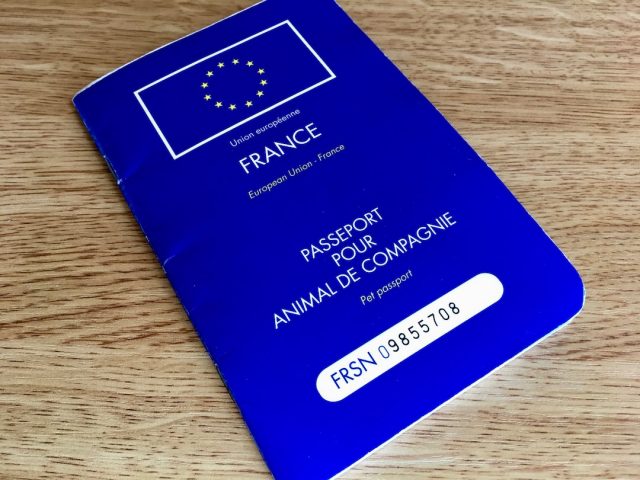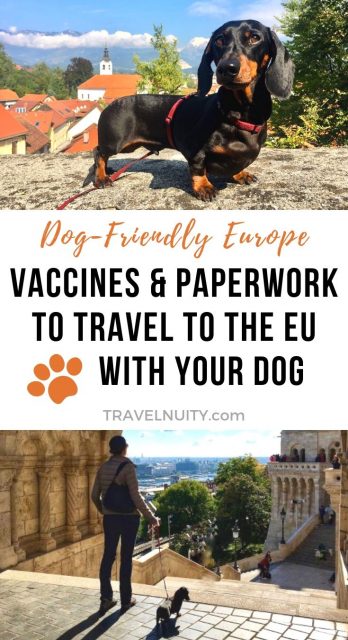So, you’re planning on taking your dog to Europe, whether on a holiday or for a longer stay. Europe is a great place to take your dog, as it’s certainly the most dog-friendly region of the world. Plus it’s usually easy to travel between countries in Europe with a dog, at least within the European Union. But, how do you travel to Europe with your dog in the first place?

Travelling to the European Union with a Dog
If you’re travelling to the European Union (EU) with your dog, the rules to enter with your dog are virtually the same for every country. There’s no need to track down different rules for each country, you just need to learn the one set of rules.
The complete rules are set out on this single page on the European Commission website. The rules are fairly clear and this page should always be your final port of call (as sometimes rules do change). But to save you deciphering this page, here’s everything you need to know about taking your dog to Europe in simple language.

What Countries are in the European Union?
Currently, there are 27 countries in Europe that are part of the EU. These countries are: Austria, Belgium, Bulgaria, Croatia, Cyprus, Czech Republic, Denmark, Estonia, Finland, France, Germany, Greece, Hungary, Ireland, Italy, Latvia, Lithuania, Luxembourg, Malta, Netherlands, Poland, Portugal, Romania, Slovakia, Slovenia, Spain, and Sweden. The same rules for dogs apply to all these countries.
Note that the UK has now left the EU, although the rules to travel with a dog to the UK are still essentially the same.

Microchip Your Dog
Your dog needs to have a microchip (“transponder”) to travel to the European Union, which should be readable by standard microchip readers. The one exception is for dogs that have a clearly readable tattoo that was applied before 3rd July 2011.
In many countries, including my home country of Australia, this is usually already done to all dogs, when they are puppies. Even if you’re not taking dogs to Europe, it’s still a good idea to have them microchipped so that they are more easily reunited with you if they become lost.
Vaccinate Your Dog Against Rabies
Europe is largely rabies free, although wildlife-mediated rabies still occurs in some countries, including in the EU. Due to this, it’s a requirement that your dog is vaccinated against rabies before travelling to the EU.
If you’re vaccinating your dog for the first time, it must be completed at least 21 days before arriving in the EU (plus allow time for the rabies antibody titration test, if required, see below). Otherwise, any booster vaccinations must have been completed before the previous vaccine expired. (If not, you’ll need a new “primary” vaccine and to wait at least 21 days.)

I’ve heard reports that for a primary vaccine, generally it is treated as only being valid for 12 months, though I can’t find this written down officially. If it is a three year vaccine, your dog should have a booster shot before the end of the first year. Alternatively, to be certain, make sure you dog was vaccinated between 21 days and one year before entering the EU.
If you’re newly microchipping your dog, the microchip needs to be done before the anti-rabies vaccine. Note that your dog also usually needs to be at least 12 weeks old when the anti-rabies vaccine is administered (there are a few exceptions for some countries).
Is a Rabies Antibody Titration Test Required?
Depending on the country you are travelling from, a rabies antibody titration (titre) test may be required. This test confirms that your dog has been successfully vaccinated against rabies.
To see whether your country is exempt from this requirement, check the countries listed in both tables on this page. Some of the exempt countries include the United Kingdom, United States, Canada, Mexico, Australia, New Zealand and Singapore. Most other countries in Europe but not in the EU are also on the list. This means your dog does not require this test.

If your country is not exempt, the test must be done at least 30 days after your dog is vaccinated for rabies (if vaccinated for the first time) but not less than 3 months before arriving in Europe. It needs to be done by an authorised veterinarian and tested in an approved laboratory, with an antibody level equal to or greater than 0.5 IU/ml detected.
Once this test has been successfully done once, it doesn’t need to be renewed, as long as your dog is continuously revaccinated before the previous anti-rabies vaccine expires.
Is a Worming Treatment Required?
Depending on the country you are travelling to (not from in this case), your dog may require an additional preparation step, a worming treatment.
Before travelling with your dog to Finland, Ireland, Malta, Norway or Northern Ireland (plus the rest of the United Kingdom), they need to be wormed against Echinococcus multilocularis. This treatment must be done by a veterinarian, between 24 hours (1 day) and 120 hours (5 days) of your scheduled entry time.

Note that this step also applies if you’re within the EU and are travelling into any of these countries, except for travelling directly between them (excluding the United Kingdom).
For instance, if you’re travelling to France and then travelling to Ireland, your dog needs to have a worming treatment between 1 day and 5 days before your arrival in the Ireland. (See my full guide to travelling between countries in Europe.)
Paperwork to Enter the EU with Your Dog
Naturally, all of this needs to be documented somewhere and presented on arrival in Europe, in the same way that you need a passport. For your dog, this is called an “animal health certificate” (also known as the AHC or “EU Annex IV”). This also certifies that your animal is in good health and is up-to-date on the standard dog vaccines.

The health certificate needs to be completed and issued by an official veterinarian, or else by an authorised veterinarian and then endorsed by the relevant government authority. (Check with your government for the relevant authority.)
It needs to be issued by the official veterinarian within 10 days of entering the European Union. The only exception is for transport by sea, where the period is extended by the duration of the sea journey.
There’s also a second form that you’ll need to fill in yourself, stating that your dog’s movement is non-commercial and that if someone else (an “authorised person”) is transporting the dog, it is being done within 5 days of your movement.
For the forms, head here and scroll down to the section on “Health Certificate and Declaration” – click on the link to download a translated copy.
Where Can Your Dog Enter the EU?
Your dog must enter the EU through entry points designated by each country, where documentary and identity checks are then able to be performed. The possible entry points for each country are listed here. Generally most major airports are included, but only selected land borders.
Travelling to Other European Countries with a Dog
For other European countries that are not in the EU, the rules to enter the country with a dog vary, although often the same steps apply as for dogs entering the EU.
I can provide details on some countries, including the following:
Iceland: The process is more onerous. Dogs can only be imported from approved countries and a a 14-day quarantine period is required, see the government website. I recommend leaving your dog behind unless you are moving to Iceland long term.
Norway: The rules are similar to those in the EU. Norway also requires a worming treatment for your dog, similar to Finland, see above. See the latest government rules.

Switzerland: The rules are similar to those in the EU. See the latest government rules.
Turkey: Read my full post on Travelling to Turkey with a Dog, although the rules are not that clear and their application varies.
United Kingdom: The rules are essentially the same as those for the EU, although there is now a Great Britain-specific pet health certificate. Read my full post on travelling in the UK with a dog.

I recommend checking the relevant government websites for the full details required, including that you have the latest rules. A handy place to start your search is the IATA Travel Centre – select your destination country from the droplist under Customs, Currency and Airport Information.
Also note that the following European countries (according to my investigations) do not recognise 3-year rabies vaccines, instead requiring yearly vaccine, for visiting pets: Belarus, Moldova, Montenegro, Russia, Turkey, Ukraine.
Travelling Between European Countries with a Dog
Once you have arrived in Europe with your dog, you might be planning to travel to multiple European countries. Luckily, it’s often quite easy to travel between European countries with your dog, particularly in the European Union. Check out my guide to travelling with a dog between European countries.
In particular, if you travel to the EU with your dog, their health certificate used to enter the EU remains valid for four months, or until the expiry date of their rabies vaccine, whichever occurs first. During this time, the certificate can be used for their transport into other member states of the EU. The health certificate should be stamped when your enter the EU to be valid.
If you want to stay longer and travel to other European countries, head to a local vet and get your pet a European pet passport. From then on, this is the important paperwork document for your dog, including their rabies vaccine, within Europe.

While most human tourists to Europe have restrictions on how long we can stay, there’s no upper limit on how long your dog can stay in Europe.
You May Also Like
- Travelling in Europe with a Dog: The Ultimate Guide
- Rules to Travel With a Dog Between European Countries
- How to Get an EU Pet Passport
About the Author

Shandos Cleaver is the founder of Travelnuity: Dog-Friendly Travel. She has travelled extensively with her Miniature Dachshund, Schnitzel, including to 33 countries across Europe, every state and territory of Australia except Tasmania, and 10 of the United States. She’s passionate about providing inspiration and information to others wanting to travel with their dogs, whether close to home or internationally.
Inspired? Pin this to your Pinterest board!


“Rabies Antibody Titration Test (Usually)”
Why include “usually”?! This is very poor writing and makes readers confused over something so important! Use your brain, please!
Hi Jay – I fully explain what is meant by this in the text under the headline. It’s just the headline, and I can’t fully explain everything just in a short phrase. Hope the post helped you! Shandos
I am trying to find out if I need additional health certificates when I am returning to the US with my dog. I brought her with me to Austria and have been here with her for two months. Do you have any helpful information regarding this? I will fly out from Frankfurt, Germany. I cannot get a clear answer from anyone. I do not have a “pet passport” but maybe next time I will invest in one.
Hannah – I’m flying from France to the US later this month, and I’m getting a health certificate for my dog. The US regulations aren’t that clear, the main thing required is just a rabies certificate. But other travellers from the US have told me to get a health certificate (“letter of good health”) to be sure. Plus, my airline and some other airlines require it for the flight, so it’s a no brainer. I’ve also been advised that for the US authorities, they prefer it as a separate letter rather than the entry in the EU Pet Passport.
About getting the EU pet passport – one of the best advantages if you get one and get a vet to record your rabies vaccine in it (some vets aren’t okay with doing this, and require a new vaccine), is you can use it next time to return to Europe, if you plan to return soon. If you have the EU pet passport and the rabies vaccine hasn’t expired, you don’t need to go to your vet in the US again then have the paperwork certified by the USDA, just use your EU pet passport.
Thank you for this detailed article and kudos to you for answering so politely to the rude comment you received in May 🙂
We are moving to The Netherlands from Bolivia and I am looking for information about the cost of the custom’s paperwork once we arrive with the dog. Do we have to pay any custom’s fee?
Thanks Cecilia, I think I remember that comment 🙂 I don’t believe there’s a customs charge for pets arriving in the Netherlands. I’ve heard from other travellers arriving in the Netherlands with small dogs travelling in the cabin that sometimes their paperwork hasn’t even been looked at, so I’m pretty sure they haven’t paid a fee. The same would also apply to checked-in pets, that are collected at the oversize luggage area, before you walk through customs. Are you travelling with your pet in the cabin or as checked-in luggage, or as cargo?
A possible exception I can think of would be for pets travelling as cargo. Our dog had to travel like this from Australia to Madrid. However, because of the extra hassles of collecting him from the cargo terminal (plus our lack of Spanish), we had our pet transport company organise the pick-up and delivery to our hotel, so I don’t know if there was a fee. I know there are customs fees for pets travelling to the UK as cargo (the only option for pets arriving via air in the UK), but I think that’s an unusual case.
Just to confirm, I would ask your airline or email the airport. I would be interested in hearing the response!
Thank you for this information in a much more attractive format than the official one. In another place, you mention ferries and say that you found only “these two” allow dogs with passengers traveling by foot. Which two? We are struggling with how to get from Southampton to St Malo. The ferry seems to require us to have a car, and then there is a huge fee when we drop it off in France.
Katherine – The two ferries in southern England allowing foot passengers to take dogs are the DFDS ferry from Newhaven (near Brighton) to Dieppe and the Stenaline ferry from Harwich to Hook of Holland. The former one will suit you best – hopefully there are decent train connections at either end! I’ve reviewed our experience here: http://www.travelnuity.com/dfds-ferry-dieppe-newhaven-dog/. Enjoy your trip!
We are moving from the US to UK but are planning to fly into Paris and then ferry over to UK. Do you know what the requirements are for this situation? Do we need two sets of health certs etc. I know the dogs will need the deworming, but now I am concerned we may need an EU passport and titer test.
As long as you do it before Brexit (because it’s still up in the air what will happen after it), prepare one set of EU health certificates with the end destination of the UK. Once you arrive in the EU, this is valid for 4 months (get it stamped at customs at the airport), although of course you need the extra worming step also done for the UK. You would only need to get a EU passport if you don’t get the worming done until you arrive in Europe.
Hey there! So I’ll be heading to Spain with my dog, he’s a German Shepherd and about 100lbs. Do you have any advice about getting him on the plane? Do you know what to do once I have all the necessary documentation?
Unless your dog is an emotional support animal, he’ll need to go in the hold, either as checked baggage or cargo. Many airlines offer this service, but due to the pandemic some airlines have temporary stopped this. I recommend checking with multiple airlines that fly your preferred route as to whether they currently offer this (e.g. American Airlines, Delta, Iberia). They’ll also have information on the required crate size. Before flying, I recommend getting a crate as soon as possible and familiarising your dog with it. Dogs that are crate trained handle flying a lot better.
Hello, thank you for your blog it is very interesting.
I am hoping to travel from Mauritius to Barcelona with my Basset Hound. What pet transport company did you use in Barcelona to deal with collecting your dog from Customs?
Many thanks in advance for your help.
Kristine – My Australian transport company, Jetpets, organised with BaggagePets in Spain for the delivery to my hotel. Here is their website: https://www.baggagepets.com/?lang=en. Wishing you a smooth journey!
Dear Shandos,
Do you know of any vets either in Calais or near by or Dieppe or near by that do the Rabbies Tritarion Test? How long do EU laboratories take to get the results and certificate back?
Kelly
Kelly – I’m really sorry, but I had this test in my home country of Australia, so didn’t have it done in Europe. I recommend asking in my Facebook group (https://www.facebook.com/groups/dogfriendlytravelrtw).
Hi Shandos,
many thanks for this very useful information. We are planning to travel to Spain by car from the UK and I have a couple of questions.
Will we need any extra paper work/vaccines when returning to the UK?
Did you need a Rabbies Tritarion Test when you went to Spain?
Thanks
You won’t need the rabies titration test to travel between the UK and Spain. However, your dog will need a worming treatment 24 hours to 5 days before arriving back in the UK. This should be recorded on your dog’s pet passport (from an EU country or I believe pre-2021 UK pet passports) or a health certificate.
Hello Shandos
I am relocating to Spain from Australia in February. I have been exploring Pet transport companies, and they all seem to be very expensive.
Would you recommend me to bite the bullet and use their services? They average around $5000 AUD + $950 customs in Spain on arrival. It seems bizarrely expensive.
With thanks on your thoughts.. and have really appreciated reading your page.
That’s quite a bit more than I paid back in 2017, but it varies greatly depending on the size of your dog (my dog is quite small) and a lot of prices have gone up due to Covid – even flying pets domestically in Australia using pet transport companies has shotu in price. As it is, most airlines flying out of Australia require you to use a pet transport company. I know I could only find the option of booking my pet directly with Qantas back in 2017 if we instead went to London. So, it’s probably your only option. I hope all goes smoothly with your move! We can’t wait to return to Europe with our dog one day.
Hello thank you for your reply.
It helps take the weighing up of pros and cons out of it.. She is a little dog.. mostly Jack Russel, so definitely not paying for size…
Qantas will only fly with an agent now too.. so it looks like it is the only way to go..
Hi, thank you so much for the article, really helpful! Just wanted to ask something, I know its a bit tricky, but on your experience, how strict are on the borders (traveling from UK to France by ferry) with the rabies vaccination dates? We Need to travel urgently, it’s going to be like 4 days short of the 21 days, and I’m not sure how worried should we be. Thank you!
I’m sorry, but I haven’t crossed from the UK to France since Brexit, so don’t know how strict they are. Your issue may arise when getting a health certificate, when they will also check for the rabies certificate.
Thanks a lot for this post and for all the travel stories with Schnitzel! I am planning a trip to Italy with my Pet from Canada. I am having a hard time finding local vets or information on ASL to book appointments to get the return docs. Do you have any tips? I will be in Cinque Terre about 4 days prior to my return so I will probably request the health checks there.
Love your posts!
Lais – I’m sorry, but I haven’t had to do this myself yet, or visit a vet in that area. I recommend asking in my FB group, https://www.facebook.com/groups/dogfriendlytravelrtw, as I’m sure some other members have visited the vet and ASL in Italy.
Hi Shandos,
I will be bringing my dog with my to Europe for the holidays and have done a few times before already, so am aware of the USDA health certificate requirements in general. The only difference is that this time I will divide my time between two different countries within the EU (France and Italy). Therefore I will fly within Europe with her again after the initial flight from New York. Will the 1 international health certificate with the address of the hotel in Paris be sufficient when we fly to Italy? Or could they insist on me having a dog passport? (Which obviously I cannot obtain from the US and getting one in Italy has proven quite difficult the last time I was there).
Just trying to avoid being presented with unpleasant surprises when boarding my flight between France and Italy and at the Italian border/customs.
Many thanks !
The health certificate for the US is valid for further travel within the EU for a further 4 months. We travelled from Spain to Portugal (by car, so no-one checked) and then flew from Spain to France before getting an EU pet passport for our dog. Some airline check-in staff may expect a pet passport and not be familiar with the health certificate, so allow extra time at the airport. But the health certificate is acceptable. And they won’t check anything when you arrive in Italy. On the other hand, I’ve heard some reports of non-residents still getting EU pet passports in Paris, so that’s another possibility. Wishing you all the best with your trip!
We are traveling with our dog to Southern Ireland then returning to the UK before traveling to Netherlands, Germany, Denmark and Sweden.He is fully up to date with his vaccinations and rabies. He has a Health Certificate from last summer. Will this have to be renewed and will he have to have a vet’s worming tablet before entering or re entering the UK from Ireland, or the other countries?
.
When travelling from Great Britain to the EU, a new health certificate is required each time, also before your 2nd trip to the Netherlands. Your dog will require a tapeworm treatment before travelling to Ireland (pets from Great Britain are no longer exempt), between 24 hours and 5 days before arriving in Ireland, but not returning to Great Britain from Ireland. Your dog will also require a tapeworm treatment when returning from Netherlands/Germany/Denmark/Sweden.
Thank you for this post, so far the one easiest to understand. I am planning on taking my dog from Canada to Montenegro with a connection in Poland. Canada does not require Titer Test, but Montenegro is not a rabies free country. Would I have problems to enter Poland from Montenegro on my way back? Should I do the Titer Test in Canada to be safe? Also, my trip will be 14 days, do I need a new Health Certificate in Montenegro or can I go back with same paperwork issued in Canada? Thanks for your help.
Thanks for your comment Jessica! Montenegro is not part of the EU, so its rules may be slightly different (although they are usually similar to those for the EU). I haven’t been able to locate them online and even the US government doesn’t provide information for transporting pets to Montenegro.
I would definitely do a titre test for your dog, as this is required to travel from Montenegro into the EU. For more information, see: https://www.travelnuity.com/dog-travel-between-european-countries/
I’m not sure about the health certificate for the return trip. I’m not across the rules for Canada as I still haven’t visited, plus sometimes it is only required by the airline, with each airline having their own rules.
Hope this helps!
Dear Shando,
Amazing articles!
I am in the process of organising to travel trans-Europe with my dog, and was overwhelmed with the information. You’ve provided all the essential info in a concise way, can’t thank you enough!
FYI, it appears that EU Annex IV is now EU Annex III. You may want to verify this, of course, but this is my understanding.
Thank you again. 🙂
Natalie
Thanks for the clarification! It used to commonly be called Annex IV, but I haven’t noticed people using the term recently – I will investigate.
Hi Shandos,
I will be travelling to Finland in 10 days time , my pet dog is vaccinated against rabies , titre test done , microchipped , health cert obtained , if I cross over to Tallinn with my pet just for day trip , do I need to prepare anything from Tallinn upon returning to Finland ? I am non eu tourist but all the requirements from Finland all met n completed too. Thank you
I assume you are also having the worming treatment done, between 24 hours and 5 days of arriving in Finland? When crossing over to Tallinn, the health certificate/rabies vaccine is all that is need to cross to Estonia, but when you return to Finland, your dog also needs the worming treatment re-done, unless it’s less than 5 days after the previous treatment. As you are just visiting for the day, the done thing is to do it before the visit. Frustratingly, when I took the ferry from Stockholm to Finland, my dog’s worming treatment wasn’t checked, and perhaps it is also not always checked when crossing from Tallinn. But it’s hard to know in advance and it’s better to make sure everything is done.
Hi, I’m travelling from Canada to Egypt on Austrian Airline, my question is there a pet relief area in Vienna airport transit area?
Thank you
Sorry, I don’t believe there is. It’s best to take some puppy pee pads and find a quiet spot.
Hi Shandos,
Thanks for this very informative and easy to follow posting!
My question is in regards requirements upon returning to the US from the EU…in our case we will be returning to the US from Spain after a 5 week visit. Do you know what that timeline is like and if we need to secure any certifications while in Europe?
Thanks Laurice! The main requirement to return to the USA from Spain is to complete the CDC Dog Import Form, which you can do as early or late as you like. However, some airlines require a health certificate and individual states may also have their own requirements. Check out my full guide, with a link to check state requirements, here: https://www.travelnuity.com/travel-with-dog-to-usa/